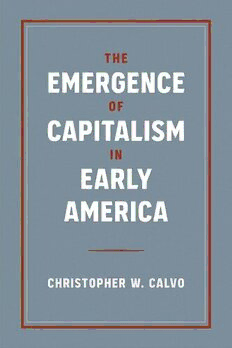
The Emergence of Capitalism in Early America PDF
Preview The Emergence of Capitalism in Early America
The Emergence of Capitalism in Early America University Press of Florida Florida A&M University, Tallahassee Florida Atlantic University, Boca Raton Florida Gulf Coast University, Ft. Myers Florida International University, Miami Florida State University, Tallahassee New College of Florida, Sarasota University of Central Florida, Orlando University of Florida, Gainesville University of North Florida, Jacksonville University of South Florida, Tampa University of West Florida, Pensacola The Emergence of Capitalism in Early America hj Christopher W. Calvo University Press of Florida Gainesville / Tallahassee / Tampa / Boca Raton Pensacola / Orlando / Miami / Jacksonville / Ft. Myers / Sarasota Copyright 2020 by Christopher W. Calvo All rights reserved Published in the United States of America 25 24 23 22 21 20 6 5 4 3 2 1 The Library of Congress has cataloged the printed edition as follows: Names: Calvo, Christopher W., author. Title: The emergence of capitalism in early America / by Christopher W. Calvo. Description: Gainesville : University Press of Florida, 2020. | Includes bibliographical references and index. | Identifiers: LCCN 2019032955 (print) | LCCN 2019032956 (ebook) | ISBN 9780813066332 (hardback) | ISBN 9780813057446 (pdf) Subjects: LCSH: Capitalism—United States—History. | United States—Economic conditions—History. | United States—Social conditions—History. Classification: LCC HC105 .C225 2020 (print) | LCC HC105 (ebook) | DDC 330.973/05—dc23 LC record available at https://lccn.loc.gov/2019032955 LC ebook record available at https://lccn.loc.gov/2019032956 The University Press of Florida is the scholarly publishing agency for the State University System of Florida, comprising Florida A&M University, Florida Atlantic University, Florida Gulf Coast University, Florida International University, Florida State University, New College of Florida, University of Central Florida, University of Florida, University of North Florida, University of South Florida, and University of West Florida. University Press of Florida 2046 NE Waldo Road Suite 2100 Gainesville, FL 32609 http://upress.ufl.edu In memory of Jorge Enrique Calvo hj Contents Acknowledgments ix 1. Introduction: Capitalism and Antebellum Thought 1 2. Laissez-Faire in the American Tradition 27 3. Progress and Poverty: Malthus and Ricardo in America 75 4. The Crisis of Free Society: The Southern and Northern Reactionaries 103 5. An American Political Economy 137 6. Henry Carey, Nature, and the Destiny of Man 180 7. Liberalism, Republicanism, and Finance 192 8. Conclusion: The Old and the New in American Economics 234 notes 243 Index 291 Acknowledgments Historians of Adam Smith are apt to point out that the complexities of the Wealth of Nations render the text impervious to concise summation, though its timeless significance compels the serious attention of anyone interested in economics. More than two centuries after its initial publication, Smith’s work is still cited as the birthplace of modern economic thought. Its ability to weave seamless and captivating narratives about the phenomena, motiva- tions, systems, interests, and institutions of market societies has helped people understand the economic world around them. This book traces the evolu- tion of American economic thought from the Wealth of Nations to the Civil War era, placing special emphasis on the domestic reception and treatment of Smith. It details the early American attempts at completing what Smith’s Wealth of Nations did, that is, account for capitalism. Early Americans spun a tangled web of interpretative ideologies drawn from Smith precisely as they immersed themselves in the material realities that morphed marketplaces into market society. The cerebral and real-world manifestations of the Wealth of Nations in early America assumed hybrid forms. This book is an intellectual history of that story. Just as the Wealth of Nations is commonly taken as a starting point in cap- italism, so too did Smith provide me with the launchpad for this project. It began when I was barely an adult in what now seems like the early stages of a previous life. I am grateful that many of the friends and family who assisted at the start are still in my life at the book’s completion. The earliest version of this project was presented to a graduate seminar taught by Darden Pyron, who in a very casual way told me, “You may be onto something here.” From there the research was guided by Howard Rock, Nicol Rae, and Peter Onuf. Each afforded important counsel, and I am even more thankful today, a
